by Dawn Field
One of the best times learning a language is when you can read something without any help. This event is especially satisfying when your knowledge is founded on vocabulary or grammar you just acquired.
Each of these ‘word rewards’ is a milestone in your language learning journey.
Each time you read something that you couldn’t before, it provides proof you are making progress.
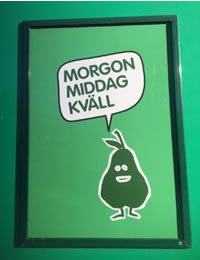
Likely, you’ve had to learn several different aspects of your chosen language to make sense of what you just read. Be proud, no matter how simple it was.
Here are some early ‘word rewards’ I experienced learning to read Swedish. Anyone learning Swedish will have their own ‘eureka moments’ but they all show how language knowledge is cumulative.
The first words we are often told to learn in a language are the greetings. In Swedish, this includes god morgon, god eftermiddag, and god kväll for good morning, afternoon and evening.
So, it was nice to see they also paid off when it came to reading this sign on the side of a shop.
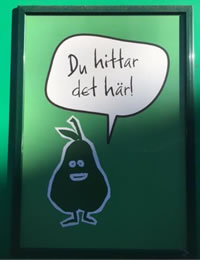
In the earliest days of learning any language, it pays to memorize all the small ‘glue’ words. These are the core vocabulary words like here, there, he, she, you, with etc. These ‘linker’ words form the majority of all words in written language.
You’ll also need a first set of basic nouns and verbs right from the beginning to read or speak any full sentences.
In terms of verbs, hitta is more common than you’d think by its English translation, to find. It’s also used as you’ll find (get) it here, as in the below sign.
As you are looking for your first core word set, be on the lookout for repeated words. Looking up any word you see twice. It’s a darn good indicator you’ll see it repeatedly.
Such words form your essential situational vocabulary.
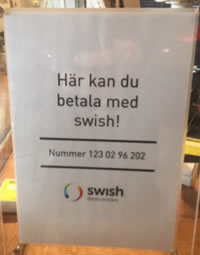
When I saw the word betala in stores I thought I’d have to look it up, but I realized its means pay, like the German bezahlen.
If you speak another Germanic language, you’ll get Swedish much easier and your time will be spent learning to recognize the cognates.
Also, learn your cultural references. For example, in Sweden people use Swish to make payments between people and businesses.
If you know your small words (här: here, kan: can, du: you, med: with), you can read this sign: “You can pay with swish here! (or literally, here can you pay with Swish).
Shopping is a key place where you’ll want to learn some words so you can buy what you want. Here’s a label of a beer bottle.
First, the cognates. There’s the German hantverk, for handmade. Then, tradition and the Latin anno, for year.
Second, knowing your small words pays off like usual: och is and. Plus, I had just learned sedan, or since. So, sedan 1848, or since 1848 now makes sense as a familiar phrase one sees everywhere.
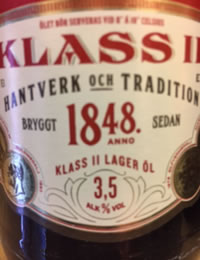
Third, one of the early Duolingo lessons is on foods and they of course include öl, or beer. This is a great case of a words you just have to memorize as you can’t guess them from knowing German or English. [Actually it's related to the English word ale]
When I first saw öl, it looked like oil but it turns out oil is olja. Just a reminder that not everything you might guess is a cognate, really is.
Forth, I knew the word bryggt, because I’d just bought a book on Swedish cafes and translated the preface and the word brewed was repeatedly used. I had also recently learned that in the past tense, many Swedish verbs end in the letter ‘t’.
This one a mix of many recent ‘learning events’ and therefore especially satisfying while exploring options for travelling in Sweden on the Internet.
First, I had already looked to travel to Stockholm, and so had learned the meaning of Gamla Stan is literally Old Town.
Second, I was studying Swedish by watching YouTube videos and saw this wonderful ‘easy conversation with English subtitles’ and one of the words that stuck as a ‘freebie’ was bridge.
Third, in the Swedish Duolingo course I had just twigged to how nouns have indefinite and definite forms. Yes, learning to recognize the indefinite and definite forms of Swedish nouns means learning four forms of most nouns.
So, many nouns that take the en indefinite article tack on -en to make the. For example, en stad is a city and staden is the city. I also picked up that definite plurals often end in -arna.
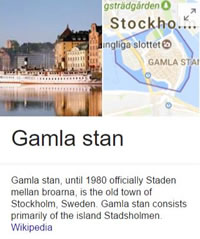
Fourth, in cramming the ‘small words’ I had just learned mellan, or between, reinforced by seeing it on an ad on the tram for kids mellan 4 och 11, or between the ages of 4 and 11.
So, my ‘big win’ was understanding the more traditional name for Gamla stan, which is Staden mellan broarna. Staden is the definite form of city, and is a German cognate. Bro is bridge, and broarna is definite plural of bridges, or the bridges.
Taking this all together and knowing that Stockholm is a set of islands connected by many bridges, it’s clear that Staden mellan broarna literally means ‘the city between the bridges.’
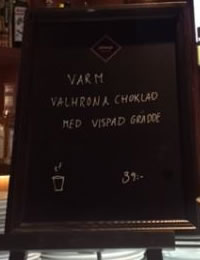
This was the first full sign I could read in Swedish. I happened to know the vocabulary because I translated a recipe for the famous Swedish cheese pie, made from Västerbotten ost (cheese) and it includes vispgrädde (whipped cream).
Fika is an innately Swedish experience and there are many cafes to visit and this sign on the counter reads hot chocolate with whipped cream. Vahlrona is a brand, another cultural reference.
This sign emphasizes how everyone acquires their situational vocabulary in their own order. Whip cream is rarely one of the first words anyone learns in a new languages, but it was for me as a café and Swedish food aficionado.
Enjoy and take note of moments like this whenever they happen at the start of learning a language as they are special.
Once you take the step of being able to read groups of words, instead of just recognizing individual words, you are way ahead on your language acquisition path.
Word rewards highlight how what you learn in one situation can help you in many situations. The payoff is especially big if you focus on ‘core
vocabulary’ and basic grammar that explains the order and variations of words (like singulars versus plurals).
Learning a new language as quickly as possible requires moving through stages: 1) greetings 2) the ‘small words’, 3) beginning nouns and verbs 4) basic grammar rules, 5) cognates and cultural references, such as the ubiquitous use of swish payments in Sweden, and finally 6) situational vocabulary.
These examples highlight how dependent beginner vocabulary is on experience and context in the real world. Everyone’s situational vocabulary will develop differently. That is natural and expected.
These texts also underscore how it often takes several different aspects of language to fall together at once to make you able to decipher even quite simple groups of words.
This provides all-the-more incentive to pass that basic threshold of understanding the mechanics of your target language as early as possible. Once you acquire this basic knowledge of a language system, much of your target language will begin to make sense.
Luckily, word rewards like these will keep coming the entire time you learn a language. With effort, there will always exist something harder, more complex, more of interest to you that you will come to conquer by reading effortlessly.
Dawn Field is Lamberg International Guest Professor in the Department of Marine Sciences at Göteborg University in Sweden.
Writing systems | Language and languages | Language learning | Pronunciation | Learning vocabulary | Language acquisition | Motivation and reasons to learn languages | Arabic | Basque | Celtic languages | Chinese | English | Esperanto | French | German | Greek | Hebrew | Indonesian | Italian | Japanese | Korean | Latin | Portuguese | Russian | Sign Languages | Spanish | Swedish | Other languages | Minority and endangered languages | Constructed languages (conlangs) | Reviews of language courses and books | Language learning apps | Teaching languages | Languages and careers | Being and becoming bilingual | Language and culture | Language development and disorders | Translation and interpreting | Multilingual websites, databases and coding | History | Travel | Food | Other topics | Spoof articles | How to submit an article
[top]
You can support this site by Buying Me A Coffee, and if you like what you see on this page, you can use the buttons below to share it with people you know.

If you like this site and find it useful, you can support it by making a donation via PayPal or Patreon, or by contributing in other ways. Omniglot is how I make my living.
Note: all links on this site to Amazon.com, Amazon.co.uk
and Amazon.fr
are affiliate links. This means I earn a commission if you click on any of them and buy something. So by clicking on these links you can help to support this site.
[top]